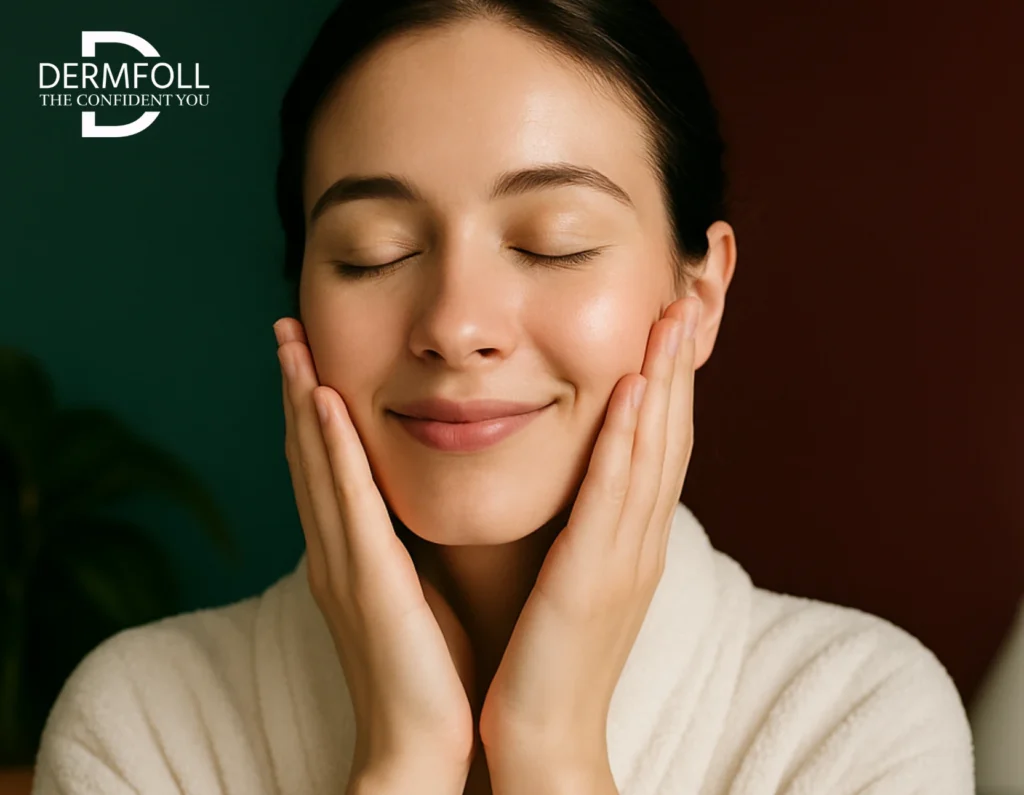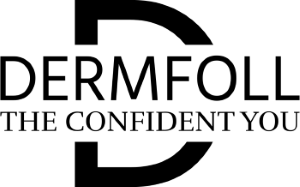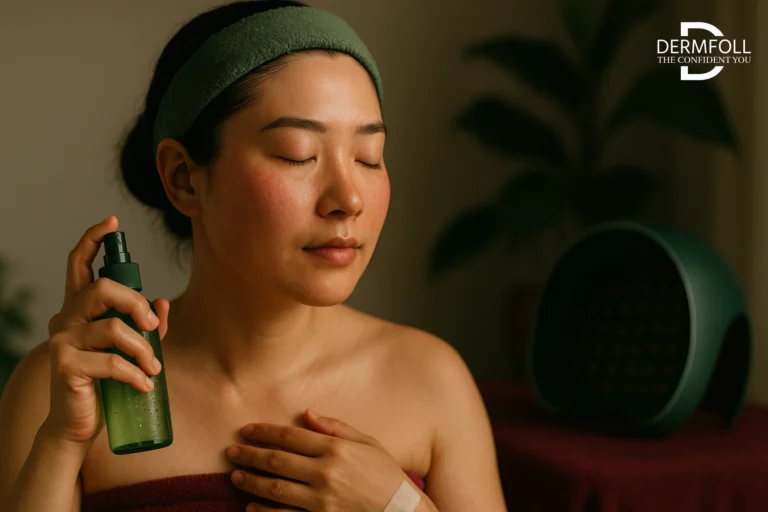Is your skincare routine actually harming your skin? What is tewl in skin care?
We’ve all heard that hydration is the key to healthy, bright skin. But what if the creams you use to moisturize are in secret doing more damage than good? Transepidermal Water Loss (TEWL) could be a root cause of your skincare issues.
If you’ve ever had dry, flaky, or itchy skin despite trying several cures, you’re not alone. Many people struggle with these challenges without realizing what’s behind them. Resulting in frustration and a cabinet full of redundant supplies.
That’s why we’re here: to help you understand TEWL and protect your skin efficiently. In this piece, we’ll look at three landmark research that explain what TEWL. Also how how to prevent it.
Welcome to DERMFOLL, We’ll look at the science behind TEWL. Asses how it influences skin health, and give research-backed tips. So, if you’re ready to change your skincare routine and finally reach your desired standards, keep reading.
What Is Tewl In Skin Care?
Transepidermal Water Loss (TEWL) is the quantity of water that evaporates passively through the epidermis into the surrounding environment.
It measures the skin’s barrier function. Consider it an indicator of the integrity of your stratum corneum, the skin’s outermost layer.
A standard measurement used to evaluate skin health. With its utility in determining the efficacy of cosmetic and dermatological therapies.
If you want to know more about TEWL. Feel free to read our previous articles on this subject.
How Does TEWL Skin Barrier Function Affect Overall Skin Health?
What Is the Impact of TEWL Skin Barrier Function on Hydration Levels?
TEWL is directly related to the skin barrier function. A good barrier reduces water loss. It guards against foreign irritants, allergens, and infections.
Increased TEWL suggests a weakened barrier. This results in dry, flaky, and potentially irritated skin.
How Does TEWL Skin Barrier Function Influence Skin Hydration and Aging?
Skin elasticity and smoothness depend on proper stratum corneum hydration. High TEWL causes dehydration of the skin. Rendering it prone to damage and premature aging.
Which Skin Conditions Are Linked to TEWL Skin Barrier Function?
Elevated TEWL is commonly connected with a variety of skin diseases. Atopic dermatitis, psoriasis, and ichthyosis are a few disorders with a significant degree of association.
characterized by poor barrier function. This leads to increased water loss and associated skin problems.
How Does TEWL Skin Barrier Function Influence Treatment Efficacy?
Measuring TEWL is critical for evaluating the efficacy of skincare products and treatments. Especially when aiming to restore or improve the skin barrier.
Products that lower TEWL are believed to improve skin hydration and barrier function.
What Factors Influence TEWL Skin Barrier Function?
We have created an overview of both external and internal factors that affect TEWL and the skin barrier function.
External factors
How Does Humidity Impact TEWL Skin Barrier Function?
Low humidity levels enhance TEWL, therefore the drier your environment, the faster you lose hydration. Contributing to chapped skin.
In contrast, humid conditions can help keep skin hydrated by minimizing water loss. If you reside in a dry area, experts recommend using effective moisturizers.
How Do Temperature and Wind Affect TEWL Skin Barrier Function?
Extreme temperatures, both hot and cold, can damage the epidermal barrier, resulting in increased TEWL.
Heat can trigger sweating, which might result in dehydration.
Colder temperatures can impede lipid production in the stratum corneum.
and,
Winds can erode the skin’s natural lipids. Increasing TEWL, resulting in dryness and discomfort.
Intrinsic factors
How Does Age Influence TEWL Skin Barrier Function?
Aging skin often has compromised barrier function. This is attributed to changes in lipid composition and lower ceramide levels.
And changes in collagen type that occur with age can result in a thinner stratum corneum.

Intrinsic factors : How Do Genetics Affect TEWL Skin Barrier Function?
The skin barrier’s integrity can be influenced by genetic predispositions. A lot of variables contribute to this predicament.
What Is Ichthyoses and Its Impact on TEWL?
Condition: Dry, scaly skin exhibiting poor barrier function.
Gene mutations involving ABCA12, lipoxygenase-3, 12R-lipoxygenase, CYP4F2 homolog, ichthyin, and steroid sulfatase.
The effect is often characterized by extensive, thick, plate-like scales. Resembling fish scales. As a result, lipid barriers are damaged and TEWL levels rise.
How Do Filaggrin Gene Mutations Influence TEWL Skin Barrier Function?
Condition: Causes ichthyosis vulgaris. Individuals are very likely to acquire atopic dermatitis.
Gene mutations that cause loss of function in the filaggrin gene.
Affected people frequently have very visible lines on their palms. Their skin contains small, scratchy pimples, particularly on the arms and thighs.
Which can feel like sandpaper. This results in a compromised skin barrier.
What Is Netherton Syndrome’s Effect on TEWL and Skin Barrier Function?
Severe skin scaling and increased skin permeability, making patients susceptible to infections and allergies.
Mutations of the SPINK5 gene.
Skin barrier is compromised, resulting in extreme dryness. Interestingly, this condition additionally exhibits trichorrhexis invaginata, commonly referred to as bamboo hair.
When seen under a microscope, the hair seems to have bamboo-like parts. Rendering them extremely fragile and prone to breaking.
How Do Skin Conditions and Damage Affect TEWL?
Aside from being caused by genetic disorders, a compromised skin barrier and high levels of TEWL on their own are a cause for concern.
Which Compromise the Skin Barrier Function?
Eczema, psoriasis, and ichthyosis are all characterized by poor barrier function.
Mechanical Damage.
Physical abrasions, wounds, or even excessive and harsh exfoliation can all jeopardize your stratum corneum.
Harsh soaps, detergents, and other chemicals can deplete the skin’s natural oils.
How Can Transepidermal Water Loss Be Prevented By Tropical Supplements
The right topical formulation can improve your skin’s barrier function. And how is it that the help? The key mechanisms are as follows:
How Does Restoring Lipid Content Improve TEWL Skin Barrier Function?
Many topical treatments contain lipids that are comparable to those found naturally in skin. Some examples being ceramides, fatty acids, and cholesterol. They help restore the stratum corneum, strengthening there barrier characteristics.
How Does Hydration Enhancement Reduce TEWL?
Ingredients that attract and hold moisture. Hydrating agents that contain hyaluronic acid and glycerin improve skin moisture. Strengthening barrier function and lowering TEWL.
What Anti-inflammatory Properties Aid in TEWL Skin Barrier Function?
Epigallocatechin gallate, which is found in green tea extract. Chamomile contains bisabolol and chamazulene.
Why Anti-inflammation? The context of using anti-inflammatory agents are to avoid disruption of the skin barrier. This may not directly give you the desired result.
however, these ingredients create an environment that facilitates better barrier function. And help immensely in alleviating skin irritation.
How Does Skin Cell Turnover Affect TEWL and Skin Barrier Health?
Skin cell turnover occurs when old skin cells shed and new ones form, keeping the skin fresh and healthy.
Compounds like retinoids and peptides can help to stimulate healthy skin cell turnover. Maintaining a healthy stratum corneum.
What Are the Roles of Occlusive Agents in Preventing TEWL?
Occlusive agents create a physical barrier over the skin’s surface. This barrier helps to retain moisture by limiting water loss. Commonly used occlusive agents include:
Petrolatum is an effective occlusive agent that forms a protective layer on the skin. Preventing water loss and maintaining skin hydration.
Dimethicone is a silicone-based chemical that prevents moisture loss. Provides an additional benefit of silky texture and improved skin smoothness.
Mineral oil reduces water evaporation from the skin’s surface.
Are There Any Effective Ingredients To Reduce TEWL?
Several compounds have been clinically proven to reduce TEWL.
Here are the highlights of their impact on TEWL.
Could Hyaluronic Acid, Glycerin, And A Certain Extract Be the Secret to Reducing TEWL
A study evaluating the effects of hyaluronic acid, glycerin, and Centella Asiatica extract on skin hydration and barrier function came to the following conclusion.
The study found a decrease from 16±6 g/m²/h to 13±4 g/m²/h in TEWL in the test group. Indicateing enhanced barrier function and hydration.
Given the test employed a combination of the aforementioned ingredients. The effects can be interpreted appropriately.
Hyaluronic acid retains water. Glycerin contains humectant characteristics. Centella Asiatica is known for its anti-inflammatory and wound-healing properties. These compounds helped to increase TEWL and skin barrier function.

What Does Centella Asiatica Extract Do For Skin ?
Centella Asiatica extract offers several benefits for the skin, including:
- Anti-inflammatory properties: It helps reduce inflammation, which is beneficial for soothing irritated or sensitive skin.
- Antioxidant effects: It provides protection against oxidative stress, helping to combat environmental damage and slow down the aging process.
- Collagen synthesis promotion: It stimulates collagen production, improving skin elasticity and reducing the appearance of fine lines and wrinkles.
- Wound healing: Centella Asiatica promotes the healing of minor wounds and reduces scarring by accelerating the skin’s repair processes.
- Hydration and moisture retention: It supports skin hydration by strengthening the skin barrier, thus preventing water loss.
Can N-acetylcysteine (NAC) Reduce TEWL? What the Study Say
A study undertaken to test the effects of NAC on Atopic dermatitis found the following.
A significant decreased in TEWL was reported, from 18.1±15.1 g/m²/h to 10.8±11.2 g/m²/h in Atopic Dermatitis patients.
The control group of healthy individuals experienced a decline in TEWL as well, from 13.5±8.9 g/m²/h to 10.1±6.1 g/m²/h.
Known for detoxifying the skin, reducing redness, and improving overall texture. NAC increases skin barrier function by increasing glutathione production.
What Is N Acetylcysteine Mechanism Of Action
- Antioxidant Action:
- N-acetylcysteine (NAC) enhances skin’s antioxidant defenses by boosting glutathione synthesis, a critical antioxidant in the skin.
- Neutralizes free radicals and prevents oxidative damage to skin cells and lipids.
- Barrier Function Improvement:
- Protects essential components of the skin barrier, maintaining integrity and function.
- Ceramide Synthesis:
- NAC promotes ceramide production, which are key lipids that help form the barrier in the stratum corneum.
- Strengthens the skin barrier, reducing transepidermal water loss (TEWL) and preventing moisture loss.
- Relevance in Skin Conditions:
- Particularly beneficial for individuals with skin conditions such as ichthyosis or eczema, where the skin barrier is compromised and prone to increased TEWL.
Could Nanostructured lipid carriers (NLCs) Reduce TEWL by Up to 60%?
The Nanostructured Lipid Carrier is a sort of delivery method. They deliver active, delicate, and at times sensitive ingredients to your skin. Which would otherwise be less beneficial.
The study found a significant reduction in TEWL with up to 60.43%. NLCs improve skin moisture by producing a homogeneous, compact layer on the surface.
Advantages Of Nanostructured Lipid Carriers
Because of their unique properties, nanostructured lipid carriers are highly effective. Possessing properties that include:
Enhanced Penetration: Increases the delivery of active substances deeper into the skin.
Controlled Release: Ensures that active substances are released gradually over time.
Improved Stability: Keeps sensitive chemicals from degrading.
Improved Skin Hydration: Helps to keep moisture levels in the skin.
Reduced Irritation: The active components’ potential for irritation is minimized. Which is accomplished by controlled release and focused delivery.
Panthenol-containing Emollient (NTP-CE): Can Panthenol on Skin Reduce TEWL?
Another study evaluated topical panthenol-containing emollients and their ability to promote TEWL.
In this study, “challenged skin” refers to skin that has been damaged by a harsh chemical. Which removes the skin’s protective defenses. This exercise fosters a better understanding to assess an agent’s effectiveness. In this investigation, SDS (sodium dodecyl sulfate) was employed as a damaging agent.
“Unchallenged skin” refers to typical, healthy skin. The findings demonstrate how panthenol reduces water loss in both damaged and healthy skin.
The study found a reduction in TEWL in SDS-challenged skin from 20.69±6.99 g/m²/h to 16.45±5.52 g/m²/h.
Can Facial RF Skin Tightening Help Your Skin Barrier?
So we’ve talked about TEWL skin barrier function, how your skin loses moisture when that barrier gets compromised. But what if I told you that radio frequency facial devices might help more than you think?
RF skin tightening works by sending gentle heat into the deeper layers of your skin. That heat kickstarts collagen production. Which firms the dermis.
And when your skin’s foundation is stronger, your outer layer (the stratum corneum) gets more support too, making it better at holding onto moisture.
That means fewer dry patches, better hydration, and less water loss over time.
Of course, let’s not skip the fine print. If misused, RF skin tightening risks include burns or hyperpigmentation, especially if your skin barrier is already irritated. Always use pro devices safely and stick to trained providers when in doubt.
So, could RF be a secret weapon in your hydration game? Definitely . It’s more than just skin-deep glow, it’s science-backed barrier support.
CONCLUSION
Wrapping Up: Taking Control of Your Skin’s Health
Understanding transepidermal water loss (TEWL) is a game changer in skincare. We’ve investigated how TEWL affects your skin’s barrier function. Now you understand how moisture levels affect illnesses like eczema and psoriasis.
Understanding variables that contribute to TEWL, such as the conditions your surroundings creates. You can take proactive steps to preserve your skin by being aware of your impending age and genetic makeup.
Hyaluronic acid, glycerin, Centella Asiatica extract, and N-acetylcysteine in your skincare routine will significantly reduce TEWL while enhancing moisture retention.
But here’s the real question: are you doing enough to hydrate your skin from within?
If you want to know about the opposite side of the hydration equation, we’ve got you covered. Our next topic, “Skin Moisture Barrier: 9 Best Tropical Supplements” where we’ll understand the science of skin hydration. And give expert recommendations for efficiently regulating your skin’s moisture levels.
Ready to upgread your skincare game? Discover how to obtain that beaming glow by balancing both water loss prevention and active hydration. Don’t miss out; your path to healthier, more vibrant skin continues here.









